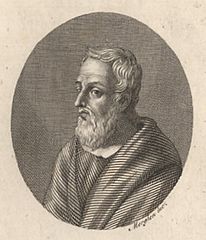
Maths in a minute: The square root of 2 is irrational

The proof of the irrationality of root 2 is often attributed to Hippasus of Metapontum, a member of the Pythagorean cult. He is said to have been murdered for his discovery (though historical evidence is rather murky) as the Pythagoreans didn't like the idea of irrational numbers.
This means that $a^2$ is an even number: it's a multiple of $2$. Now if $a^2$ is an even number, then so is $a$ (you can check for yourself that the square of an odd number is odd). This means that $a$ can be written as $2c$ for some other whole number $c$. Therefore, $$2b^2 = a^2 = (2c)^2 = 4c^2.$$ Dividing through by $2$ gives $$b^2 = 2c^2.$$ This means that $b^2$ is even, which again means that $b$ is even. But then, both $a$ and $b$ are even, which contradicts the assumption that they contain no common factor: if they are both even, then they have a common factor of $2$. This contradiction implies that our original assumption, that $\sqrt{2}$ can be written as a fraction $a/b$ must be false. Therefore, $\sqrt{2}$ is irrational.
This proof is famous example of something called a proof by contradiction. You can read more about this type of proof in the article Something from nothing?
Comments
Matt Lehman
There's a shorter proof which requires unique factorization of integers, while ignoring the assumption that a and b have no common factors.
Given a^2 = 2b^2, neither have the same number of 2s as a factor, therefore they can't be equal.
Thomas Lang
That's the problem though: the proof through unique factorisation assumes the Fundamental Theorem of Arithmetic, which needs to be built from the ground up first. Either way, the irrationality of root 2 is a great piece of mathematics both for us and the ancient humans.
Bill Dixon
But the Euclid proof also depends on the Unique factorization Theorem, otherwise it would not be possible to decide whether a/b was in its lowest form
E. Macías
Not really, you only have to indicate at the beginning of the proof that the numbers a, b they are not both even, otherwise you should simplify by dividing each one by 2
Balkrishna Shetty
Even after dividing by 2, both a and b may still be even! You need mathematical Induction to select the least a( or least b) such that a- square divided by b- square is two.